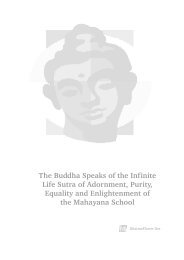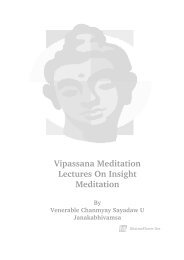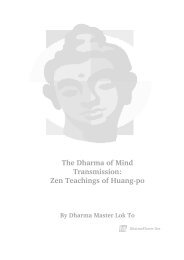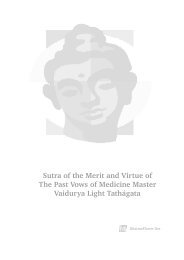THE FOUR NOBLE TRUTHS By Ajahn Sumedho - DharmaFlower.Net
THE FOUR NOBLE TRUTHS By Ajahn Sumedho - DharmaFlower.Net
THE FOUR NOBLE TRUTHS By Ajahn Sumedho - DharmaFlower.Net
Create successful ePaper yourself
Turn your PDF publications into a flip-book with our unique Google optimized e-Paper software.
ASPECTS OF MEDITATIONThis reflectiveness of mind or emotional balance is developed as aresult of practising concentration and mindfulness meditation. Forinstance, you can experiment during a retreat and spend one hourdoing samatha meditation where you are just concentrating yourmind on one object, say the sensation of breathing. Keep bringing itinto consciousness and sustain it so that it actually has a continuityof presence in the mind.In this way, you are moving towards what is going on in your ownbody rather than being pulled out into objects of the senses. If you donot have any refuge within, then you are constantly going out, beingabsorbed into books, food and all sorts of distractions. But thisendless movement of the mind is very exhausting. So instead, thepractice becomes one of observing the breath - which means that youhave to withdraw or not follow the tendency to find something outsideof yourself. You have to bring your attention to the breathing of yourown body and concentrate the mind on that sensation. As you let go ofgross form, you actually become that feeling, that very sign itself.Whatever you absorb into, you become that for a period of time. Whenyou really concentrate, you have become that very tranquillisedcondition. You have become tranquil. This is what we call becoming.Samatha meditation is a becoming process.But that tranquillity, if you investigate it, is not satisfactorytranquillity. There is something missing in it because it is dependenton a technique, on being attached and holding on, on something thatstill begins and ends. What you become, you can only becometemporarily because becoming is a changing thing. It is not apermanent condition. So whatever you become, you will unbecome. Itis not ultimate reality. No matter how high you might go inconcentration, it will always be an unsatisfactory condition. Samathameditation takes you to some very high and radiant experiences inyour mind - but they all end.Then, if you practise vipassana meditation for another hour by justbeing mindful and letting go of everything and accepting theuncertainty, the silence and the cessation of conditions, the result isthat you will feel peaceful rather than tranquil. And that peacefulnessis a perfect peacefulness. It is complete. It is not the tranquillity fromsamatha, which has something imperfect or unsatisfactory about iteven at its best. The realisation of cessation, as you develop that andunderstand that more and more, brings you to true peacefulness,non-attachment, Nibbana.Thus samatha and vipassana are the two divisions in meditation. Oneis developing concentrated states of mind on refined objects in whichyour consciousness becomes refined through that concentration. But









